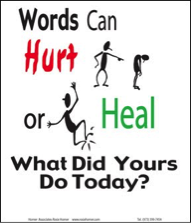 “Sticks and stones may break my bones, but words can never hurt me.” This is a common childhood rhyme but it couldn’t be more untrue. Words can cause scars that no one can see. I think a better phrase would be “Sticks and stones may break my bones, but words can scar for life”. I recently attended a training that discussed trauma. I was very surprised to learn that emotional trauma frequently has as long-lasting effects as, and some even more so than, physical abuse (Developmental & Neurobiological Impact of Child Maltreatment & Abuse, Spinazzola). In discussing that statistic with those at the training, we discussed possible reasons. One common thread seemed to be that sexual and physical abuse can be isolated incidents while emotional abuse can often be ongoing. Also, we, as a society, do more prevention and intervention for sexual and physical abuse. Emotional abuse is often overlooked and not discussed. So let’s discuss it. What is emotional abuse? It is when someone feels bad using words or actions. (So other forms of abuse can fall in this). For example, telling your child that they always do things wrong. Even if you say this when they just made a mistake, it can have far-reaching consequences. This can lower self-esteem and become a self-fulfilling prophecy. When frustrated, it’s okay to express that frustration but try saying “This behavior frustrates me.” Or “It makes me unhappy when you act this way.” We should try to focus on the actions and how they make us feel, instead of focusing on the child. Another example of emotional abuse would be “Why do you have to be so bad all the time.” Try instead “When you hit your sister, you are not behaving correctly.” Or “When you hit your sister, it upsets me as you are acting mean.” Again focus on your feelings and the actions instead of the kid being a bad kid. Think about this: I frequently ask my clients if they feel they are bad and the majority feel they are bad kids. I then ask if they are bad kids or if they make bad choices. Some still say they are bad kids but others say they make bad choices. It is important that we as the adults in their lives help them understand this distinction. Most people are not bad people, we just make bad choices. The same goes for kids. By changing the way we speak to kids, we can help change how they feel about themselves.
0 Comments
Leave a Reply. |
JENNIFER EULBERG, MA, LPCWelcome Jennifer, our new blogger!
Jennifer is a counselor at Sandhill who specializes in depression, self-esteem, and grief & loss. Get to know Jennifer as she shares her perspectives on life, contemplates value themes, and offers gentle encouragement. THANK YOU to Stefanie Pisarkiewicz, LPC for her blog contributions from November 2014 - February 2019! Archives
May 2024
Categories |
|
CALL TO SCHEDULE AN APPOINTMENT
636-379-1779 |
|
Locations:
801 S. Woodlawn Avenue, Suite 15, O'Fallon, MO 63366 13303 Tesson Ferry Road, Suite 50, St. Louis, MO 63128 Email: [email protected] Phone: 636-379-1779 • Fax: 636-634-3496 |
